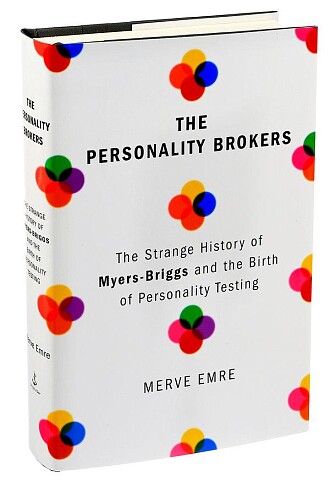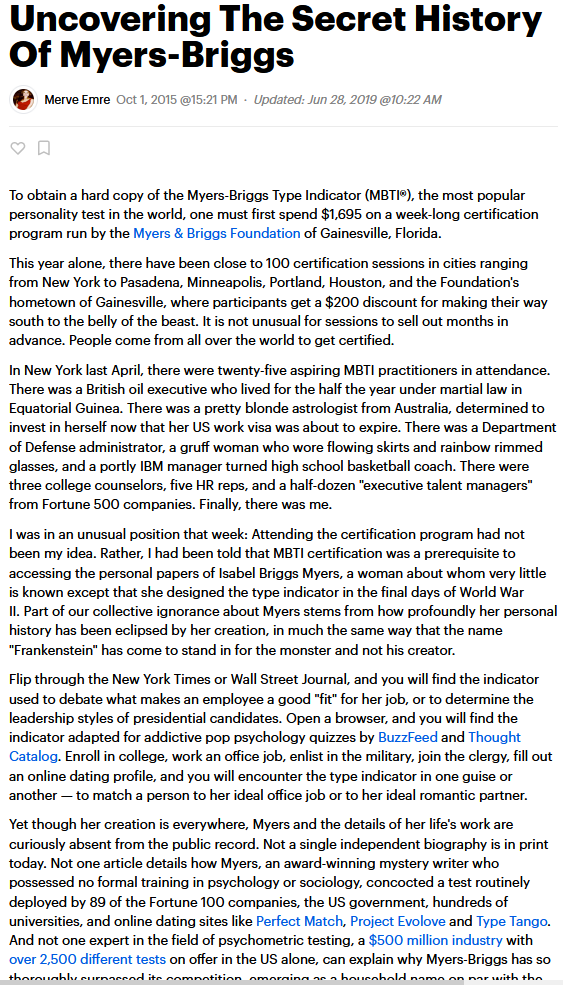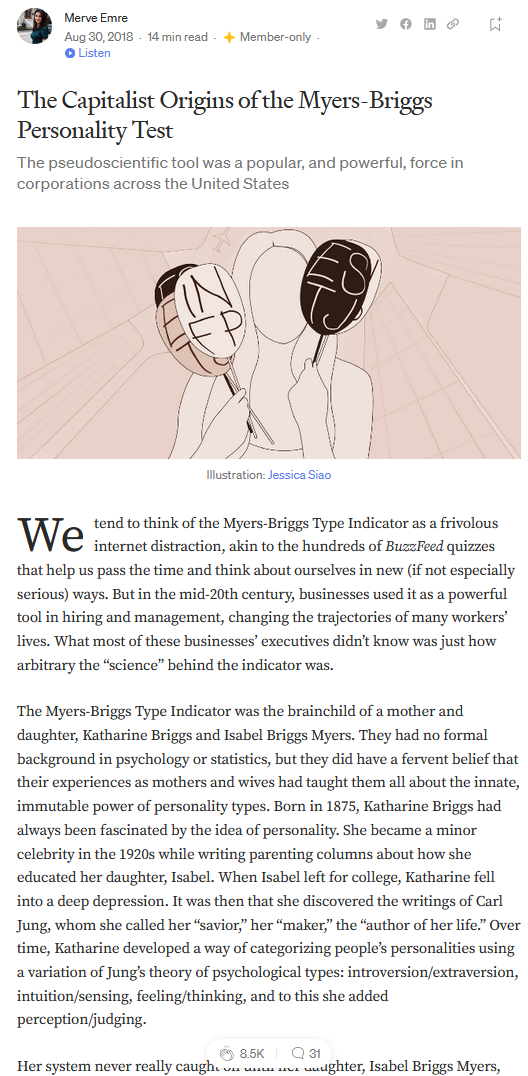Myers-Briggs the Personality Test Scam (2019)
I am INTP! The logician, the mad scientist!

- The Personality Brokers: The Strange History of Myers-Briggs and the Birth of Personality Testing
- By Merve Emre.
- Buy at amazon
i was gonna post about following the author. but i looked into her tweets, most of it is marketing of her book. Then, i saw possible hints about anti Jordan Peterson , and she titled one of her article on debunking by associating with Capitalism.
so, am currently in the middle of few-hours research into her.
article by the author:

- Uncovering The Secret History Of Myers-Briggs
- By Merve Emre.
- http://digg.com/2015/myers-briggs-secret-history
this is a great article. It uncovers the unsavory history of the test, and how the org behind it is squeezing money.
though, the article is mar'd, by the author's leftism streak. Like, she tears down one, and installs her own.
here's another of her article, i haven't read:

- The Capitalist Origins of the Myers-Briggs Personality Test
- By Merve Emre.
- https://medium.com/s/story/the-capitalist-origins-of-the-myers-briggs-personality-test-309187757d4e
at one point, for a few years, i think was early 2000s, the test is online everywhere, in every discussion forum. i recall, there was dedicated intp or was it intj forum. all the nerds comes forward and declare themselves.
i read a book on it back in 1996 or so. found it:
- Please Understand Me: Character and Temperament Types
- By David Keirsey , Marilyn Bates.
- Buy at amazon
i read extensively on psy stuff. part of it is self analysis, always thought i got some problems. (turns out, my type, problem, is called schizoid personality “disorder”.) part of it, is extreme fascination with brain washing, propaganda, thought controll, marketing, cult, methods.
self psychology test, is 1 of those things people love but also a common pseudo science. Lots orgs use it to recruit or deceit. e.g. scientology uses it. women particularly love astrology stuff. and in china japan taiwan, it's blood type, and palmistry.
however, personality, is undeniable, and has some scientific basis. The test accepted by psychologists today is Big Five personality traits. Based on 5 factors: openness, conscientiousness, extraversion, agreeableness, neuroticism. Go there and rate urself on these scales.
here's Wikipedia on Big Five:
The Big Five personality traits, also known as the five-factor model (FFM) and the OCEAN model, is a taxonomy for personality traits.[1] It is based on common language descriptors. When factor analysis (a statistical technique) is applied to personality survey data, some words used to describe aspects of personality are often applied to the same person. For example, someone described as conscientious is more likely to be described as “always prepared” rather than “messy”. This theory is based therefore on the association between words but not on neuropsychological experiments. This theory uses descriptors of common language and therefore suggests five broad dimensions commonly used to describe the human personality and psyche.[2][3]
The five factors have been defined as openness to experience, conscientiousness, extraversion, agreeableness, and neuroticism, represented by the acronym OCEAN or CANOE. Beneath each proposed global factor, there are a number of correlated and more specific primary factors. For example, extraversion is said to include such related qualities as gregariousness, assertiveness, excitement seeking, warmth, activity, and positive emotions.[4]
That these underlying factors can be found is consistent with the lexical hypothesis: personality characteristics that are most important in people's lives will eventually become a part of their language and, secondly, that more important personality characteristics are more likely to be encoded into language as a single word.
- Openness to experience (inventive/curious vs. consistent/cautious). Appreciation for art, emotion, adventure, unusual ideas, curiosity, and variety of experience. Openness reflects the degree of intellectual curiosity, creativity and a preference for novelty and variety a person has. It is also described as the extent to which a person is imaginative or independent and depicts a personal preference for a variety of activities over a strict routine. High openness can be perceived as unpredictability or lack of focus, and more likely to engage in risky behaviour or drug taking.[5] Also, individuals that have high openness tend to lean, in occupation and hobby, towards the arts, being, typically, creative and appreciative of the significance of intellectual and artistic pursuits.[6]:191 Moreover, individuals with high openness are said to pursue self-actualization specifically by seeking out intense, euphoric experiences. Conversely, those with low openness seek to gain fulfillment through perseverance and are characterized as pragmatic and data-driven—sometimes even perceived to be dogmatic and closed-minded. Some disagreement remains about how to interpret and contextualize the openness factor.[clarification needed]
- Conscientiousness (efficient/organized vs. easy-going/careless). Tendency to be organized and dependable, show self-discipline, act dutifully, aim for achievement, and prefer planned rather than spontaneous behavior. High conscientiousness is often perceived as being stubborn and focused. Low conscientiousness is associated with flexibility and spontaneity, but can also appear as sloppiness and lack of reliability.[7]
- Extraversion (outgoing/energetic vs. solitary/reserved). Energetic, surgency, assertiveness, sociability and the tendency to seek stimulation in the company of others, and talkativeness. High extraversion is often perceived as attention-seeking and domineering. Low extraversion causes a reserved, reflective personality, which can be perceived as aloof or self-absorbed.[7] Extroverted people may appear more dominant in social settings, as opposed to introverted people in this setting.[6]
- Agreeableness (friendly/compassionate vs. challenging/detached). Tendency to be compassionate and cooperative rather than suspicious and antagonistic towards others. It is also a measure of one's trusting and helpful nature, and whether a person is generally well-tempered or not. High agreeableness is often seen as naive or submissive. Low agreeableness personalities are often competitive or challenging people, which can be seen as argumentative or untrustworthy.[7]
- Neuroticism (sensitive/nervous vs. secure/confident). Tendency to be prone to psychological stress.[6] The tendency to experience unpleasant emotions easily, such as anger, anxiety, depression, and vulnerability. Neuroticism also refers to the degree of emotional stability and impulse control and is sometimes referred to by its low pole, "emotional stability". High stability manifests itself as a stable and calm personality, but can be seen as uninspiring and unconcerned. Low stability manifests as the reactive and excitable personality often found in dynamic individuals, but can be perceived as unstable or insecure.[7] Also, individuals with higher levels of neuroticism tend to have worse psychological well being.[8]
[2019-04-12 Wikipedia https://en.wikipedia.org/wiki/Big_Five_personality_traits ]
my own scores are somethin like this (from 1 to 5. 3 is neutral.):
- Openness: 5 (highly creative. am a genius. thousands ideas cross fly)
- Conscientiousness: 2 (i have no plan. no schedule.)
- Extraversion: 2 (am aloof, loner.)
- Agreeableness: 2 (am extreme competitive. no trust others.)
- Neuroticism: 2. (low doubt.)
See also: Are You Schizoid or Autistic